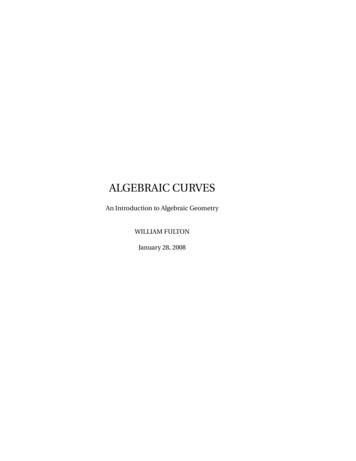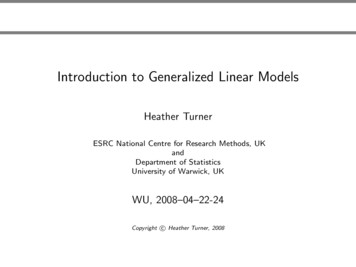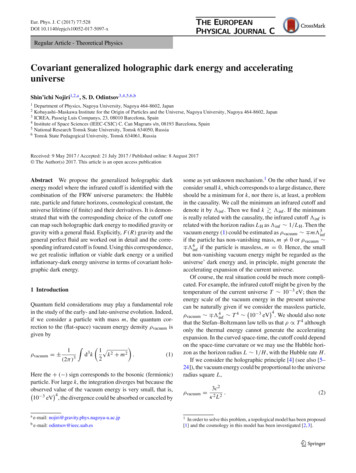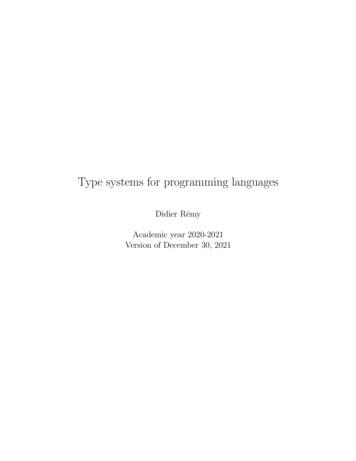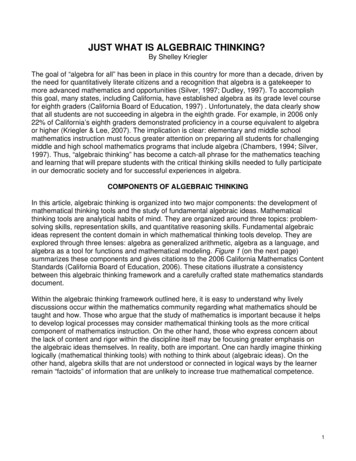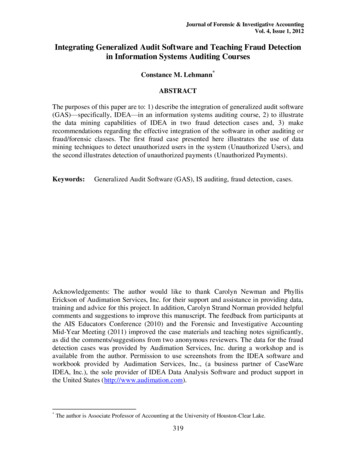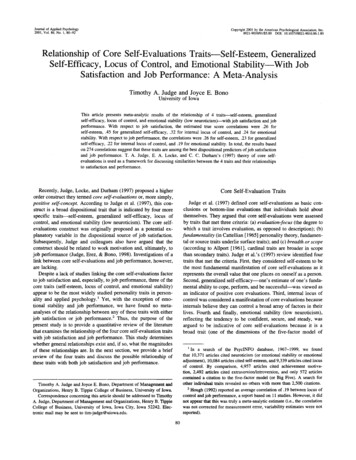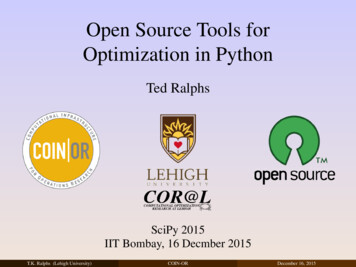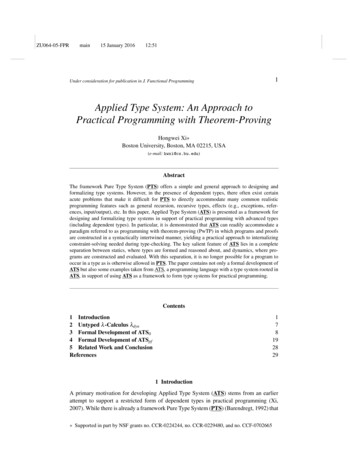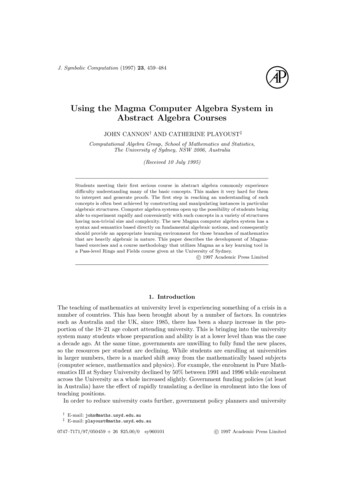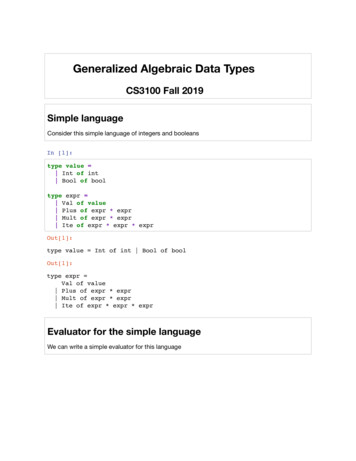
Transcription
Generalized Algebraic Data TypesCS3100 Fall 2019Simple languageConsider this simple language of integers and booleansIn [1]:type value Int of int Bool of booltype expr Val of value Plus of expr * expr Mult of expr * expr Ite of expr * expr * exprOut[1]:type value Int of int Bool of boolOut[1]:type expr Val of value Plus of expr * expr Mult of expr * expr Ite of expr * expr * exprEvaluator for the simple languageWe can write a simple evaluator for this language
In [2]:let rec eval : expr - value fun e - match e with Val (Int i) - Int i Val (Bool i) - Bool i Plus (e1, e2) - let Int i1, Int i2 eval e1, eval e2 inInt (i1 i2) Mult (e1, e2) - let Int i1, Int i2 eval e1, eval e2 inInt (i1 * i2) Ite (p,e1,e2) - let Bool b eval p inif b then eval e1 else eval e2File "[2]", line 6, characters 4-62:Warning 8: this pattern-matching is not exhaustive.Here is an example of a case that is not matched:((Int , Bool ) (Bool , ))File "[2]", line 9, characters 4-62:Warning 8: this pattern-matching is not exhaustive.Here is an example of a case that is not matched:((Int , Bool ) (Bool , ))File "[2]", line 12, characters 4-61:Warning 8: this pattern-matching is not exhaustive.Here is an example of a case that is not matched:IntOut[2]:val eval : expr - value fun Evaluator for the simple languageThe compiler warns that programs such as true 10 is not handled.Our evaluator gets stuck when it encouters such an expression.
In [3]:eval @@ Plus (Val (Bool true), Val (Int 10))Exception: Match failure ("[2]", 6, 4).Called from file "toplevel/toploop.ml", line 180, characters 17-56We need TypesWell-typed programs do not get stuck!Phantom typesWe can add types to our values using a technique called phantom typesIn [4]:type 'a value Int of int Bool of boolOut[4]:type 'a value Int of int Bool of boolObserve that 'a only appears on the LHS.This 'a is called a phantom type variable.What is this useful for?Typed expression languageWe can add types to our expression language now using phantom type
In [5]:type 'a expr Val of 'a value Plus of int expr * int expr Mult of int expr * int expr Ite of bool expr * 'a expr * 'a exprOut[5]:type 'a expr Val of 'a value Plus of int expr * int expr Mult of int expr * int expr Ite of bool expr * 'a expr * 'a exprTyped expression languageAssign concerte type to the phantom type variable 'a .In [6]:(* Quiz: What types are inferred without type annotations? *)let mk int i : int expr Val (Int i)let mk bool b : bool expr Val (Bool b)let plus e1 e2 : int expr Plus (e1, e2)let mult e1 e2 : int expr Mult (e1, e2)Out[6]:val mk int : int - int expr fun Out[6]:val mk bool : bool - bool expr fun Out[6]:val plus : int expr - int expr - int expr fun Out[6]:val mult : int expr - int expr - int expr fun Benefit of phantom types
In [7]:let i Val (Int 0);;let i' mk int 0;;let b Val (Bool true);;let b' mk bool true;;let p Plus (i,i);;let p' plus i i;;Out[7]:val i : 'a expr Val (Int 0)Out[7]:val i' : int expr Val (Int 0)Out[7]:val b : 'a expr Val (Bool true)Out[7]:val b' : bool expr Val (Bool true)Out[7]:val p : 'a expr Plus (Val (Int 0), Val (Int 0))Out[7]:val p' : int expr Plus (Val (Int 0), Val (Int 0))Benefit of phantom typesWe no longer allow ill-typed expression if we use the helper functions.In [8]:plus (mk bool true) (mk int 10)File "[8]", line 1, characters 5-19:Error: This expression has type bool exprbut an expression was expected of type int exprType bool is not compatible with type int1: plus (mk bool true) (mk int 10)
Typed evaluatorWe can write an evaluator for this language now.Let's use the same evaluator as the earlier one.In [9]:let rec eval : 'a expr - 'a value fun e - match e with Val (Int i) - Int i Val (Bool i) - Bool i Plus (e1, e2) - let Int i1, Int i2 eval e1, eval e2 inInt (i1 i2) Mult (e1, e2) - let Int i1, Int i2 eval e1, eva on on church numeralsIn [70]:max (MaxSuc (MaxEq (Refl : (z,z) eql))) (S Z) ZOut[70]:- : z s S ZThe max function seems a bit silly given that we need to provide the proof.We learn no new information. Proof already tells us that z s z .
ymax function gets term level evidence from the type level proof.Depth Indexed TreeIn [71]:type ('a, ) dtree EmptyD : ('a,z) dtree TreeD : ('a,'m) dtree * 'a * ('a,'n) dtree * ('m,'n,'o) max- ('a,'o s) dtreeOut[71]:type ('a, ) dtree EmptyD : ('a, z) dtree TreeD : ('a, 'm) dtree * 'a * ('a, 'n) dtree *('m, 'n, 'o) max - ('a, 'o s) dtreeOperations on dtreeIn [72]:let rec depthD : type a n.(a,n) dtree - n functionEmptyD - Z TreeD (l, ,r,mx) - S (max mx (depthD l) (depthD r))Out[72]:val depthD : ('a, 'n) dtree - 'n fun In [73]:let topD : type a n.(a,n s) dtree - a function TreeD ( ,v, , ) - vOut[73]:val topD : ('a, 'n s) dtree - 'a fun
In [74]:let rec swivelD :type a n.(a,n) dtree - (a,n) dtree functionEmptyD - EmptyD TreeD (l,v,r,m) - TreeD (swivelD r, v, swivelD l, MaxFlip m)Out[74]:val swivelD : ('a, 'n) dtree - ('a, 'n) dtree fun Adding lambdas to interpreterLet's add simply typed lambda calculus to our original int & bool expression evaluator.
In [75]:type typ TInt : int typ TBool : bool typ TLam : 'a typ * 'b typ - ('a - 'b) typtype 'a value VInt : int - int value VBool : bool - bool value VLam : ('a value - 'b value) - ('a - 'b) valueand 'a expr Var : string * 'a typ - 'a exprApp : ('a - 'b) expr * 'a expr - 'b exprLam : string * 'a typ * 'b expr - ('a - 'b) exprVal : 'a value - 'a exprPlus : int expr * int expr - int exprMult : int expr * int expr - int exprIte : bool expr * 'a expr * 'a expr - 'a exprOut[75]:type typ TInt : int typ TBool : bool typ TLam : 'a typ * 'b typ - ('a - 'b) typOut[75]:type 'a value VInt : int - int value VBool : bool - bool value VLam : ('a value - 'b value) - ('a - 'b) valueand 'a expr Var : string * 'a typ - 'a expr App : ('a - 'b) expr * 'a expr - 'b expr Lam : string * 'a typ * 'b expr - ('a - 'b) expr Val : 'a value - 'a expr Plus : int expr * int expr - int expr Mult : int expr * int expr - int expr Ite : bool expr * 'a expr * 'a expr - 'a expr
In [76]:let rec typ eq : type a b. a typ - b typ - (a, b) eql option fun t1 t2 - match t1, t2 with TInt, TInt - Some Refl TBool, TBool - Some Refl TLam (t1,t2), TLam (u1,u2) - begin match typ eq t1 u1, typ eq t2 u2 with Some Refl, Some Refl - Some Refl - Noneend - NoneOut[76]:val typ eq : 'a typ - 'b typ - ('a, 'b) eql option fun In [77]:type env Empty : env Extend : string * 'a typ * 'a value * env - envOut[77]:type env Empty : env Extend : string * 'a typ * 'a value * env - envEvaluationeval : a expr - a valueLimitations:Evaluation is defined only on closed terms.Type checking for variables use done at runtime.
In [78]:let rec eval : type a. env - a expr - a value fun env e - match e with Var (s,t) - begin match env with Empty - failwith "not a closed term" Extend (s',t',v,env') - if s s' thenmatch typ eq t t' with Some Refl - v None - failwith "types don't match"else eval env' eend App (e1,e2) - let VLam f eval env e1 inf (eval env e2) Lam (s,t,e) - VLam (fun v - eval (Extend (s, t, v, env)) e) Val v - v Plus (e1, e2) - let VInt i1, VInt i2 eval env e1, eval env e2 inVInt (i1 i2) Mult (e1, e2) - let VInt i1, VInt i2 eval env e1, eval env e2 inVInt (i1 * i2) Ite (p,e1,e2) - let VBool b eval env p inif b then eval env e1 else eval env e2let eval e eval Empty eOut[78]:val eval : env - 'a expr - 'a value fun Out[78]:val eval : 'a expr - 'a value fun Typing catches errorsIn [79]:eval @@ App (Lam ("x",TInt,Val(VInt 0)), (Val (VInt 10)))Out[79]:- : int value VInt 0
In [80]:eval @@ App (Lam ("x",TInt,Val(VInt 0)), (Val (VBool 10)))File "[80]", line 1, characters 46-56:Error: This expression has type bool valuebut an expression was expected of type int valueType bool is not compatible with type int1: eval @@ App (Lam ("x",TInt,Val(VInt 0)), (Val (VBool10)))Runtime errorsIn [81]:eval @@ App (Lam ("x",TBool, Plus (Val (VInt 10), Var ("x", TInt))), ValException: Failure "types don't match".Raised at file "stdlib.ml", line 33, characters 22-33Called from file "[78]", line 20, characters 40-51Called from file "toplevel/toploop.ml", line 180, characters 17-56In [82]:eval @@ Var ("x", TInt)Exception: Failure "not a closed term".Raised at file "stdlib.ml", line 33, characters 22-33Called from file "toplevel/toploop.ml", line 180, characters 17-56Fixing the runtime errorsUse the host language (OCaml) features for encoding the features in the object language(lambda calculus).The feature we use here is abstraction.Use fun (x : TInt) - e to encode Lam "x" TInt e
In [83]:type 'a value VInt : int - int value VBool : bool - bool value VLam : ('a expr - 'b expr) - ('a - 'b) valueand 'a expr App : ('a - 'b) expr * 'a expr - 'b exprVal : 'a value - 'a exprPlus : int expr * int expr - int exprMult : int expr * int expr - int exprIte : bool expr * 'a expr * 'a expr - 'a exprOut[83]:type 'a value VInt : int - int value VBool : bool - bool value VLam : ('a expr - 'b expr) - ('a - 'b) valueand 'a expr App : ('a - 'b) expr * 'a expr - 'b expr Val : 'a value - 'a expr Plus : int expr * int expr - int expr Mult : int expr * int expr - int expr Ite : bool expr * 'a expr * 'a expr - 'a exprHigher Order Abstract SyntaxThis techniqu
OCaml by default expects the function expression at the recursive call position to have the same type as the outer function. This need not be the case if the recursive function call is at different types. eval (p : int expr) and eval (p : bool expr). File "[9]", line 6, characters 4-62: Warning 8: this pattern-matching is not exhaustive.
